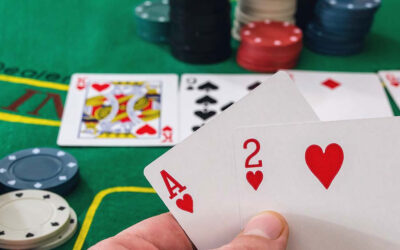
Poker in Greece has been very popular and has a large audience and fan club that takes part in many games in order to achieve the victory. But victory depends on many factors. Some say it’s about luck, others say it’s about psychology.
Really, have you ever wondered what a poker player’s psychology is and how he or she is affected by it, either positively or negatively?
Researcher Erik Schlicht and collaborators study a group of 14 novice poker players in a simplified Texas Hold’em. Each poker player is dealt two cards and allowed to see the face of his opponent on the computer screen. The player has to decide if he will fold or call. If he folds, he loses 100 chips that round. If he calls, then he may win or lose 5000 chips depending on how good his hand is compared to his opponent’s. The face of the opponent changes every round. After 300 rounds, the players are awarded money based on their wins and losses during the game.
The opponents ’faces are actually digitized images of 100 real faces; each modified to appear in 3 slightly different versions: trustworthy, neutral, or untrustworthy. For example, happy and attractive faces are associated with trustworthiness, and may include attributes such as increased distance between the eyes and the eyebrows. Angry or threatening faces are associated with untrustworthiness and may include attributes such as corners of the mouth drawn down. Neutral faces, the canonical poker faces, show neither positive nor negative expressions. The experiment shows that players take longer to make a decision and fold more often when presented with trustworthy faces than with neutral and untrustworthy ones. The players seem to assume that their trustworthy-looking opponents are not bluffing.
The current study suggests that poker players make a rapid assessment of opponents ’facial expression and use that information to make a decision about the opponents’ behaviors and their intentions. Other studies indicate that this assessment occurs within the first tenth of a second and may involve the amygdala, the brain region known to process information about memory and emotions. We size someone up, so to speak, based on our first impression of his face, and assume that he will behave according to how he looks. In this case, we assume that a trustworthy-looking person would not bluff as much as a neutral- or untrustworthy-looking one.
In an actual poker game, players observe each other’s betting and bluffing strategies after each round and factor those into their decision. On the other hand, if you are playing poker with opponents who do not know your strategies, then appearing trustworthy (as opposed to appearing threatening or keeping a poker face) may benefit you by inducing your opponents to make mistakes and fold more often.
Finally, the issue of a player’s psychology and how he should move, what mistakes he should avoid and what tips would be useful to him aroused great interest among poker players in Greece.
Tips to improve Poker in Greece
More and more poker players in Greece are seeking tactics and strategies in order to become a more confident and profitable players. In the list below, are mentioned some tips that will help a poker player to improve his strategies whether he plays tournaments, cash...
The history of Gambling and Poker in Greece
Modern forms of gambling can be traced back too many ancient cultures, from China to Egypt and beyond. Yet, the truth is that ancient Greece played a bigger part in the development of modern forms of gambling than most places. A Look at the Origins of Gambling in...
Most famous online poker games in Greece
The easiest and legal option to play poker in Greece is online poker and that’s the reason why various poker platforms have been made. Online poker gives the opportunity to offer a great satisfaction to the poker players in the easiest way. But how players evaluate...
Get In Touch
24h Support
Location
Multiple locations, Greece
Hours
Mon:16pm - 8am
Tue: 16pm - 8am
Wed: 16pm - 8am
Thur: 16pm - 8am
Fri: 16pm - 8am
Sat: 16pm - 8am
Sun: 16pm - 8am



